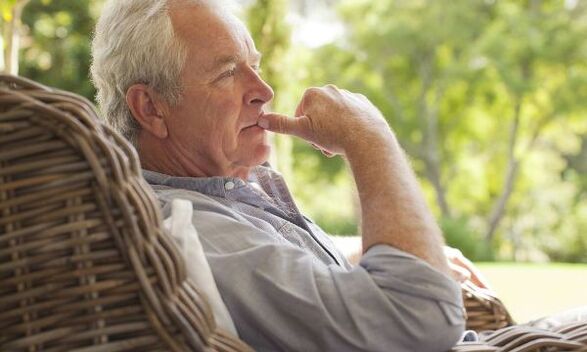With prostatitis, an inflammatory process occurs in the prostate region. This is one of the most common urological diseases. The causes of prostatitis in men are varied.

What is prostatitis?
The disease is accompanied by a violation of urination. Often, a man has a feeling of incomplete emptying of the bladder.
The main causes of acute bacterial prostatitis are infections that:
- transmitted during intimacy (ureaplasmosis, chlamydia);
- penetrate the urethra from the rectum area (Klebsiella infection, Pseudomonas aeruginosa).
If the prostate becomes inflamed, a man's emotional state can quickly deteriorate. In this case, the libido disappears.
Deterioration of the nervous system can be characterized by the following symptoms:
- anxiety;
- mood deterioration;
- sleep disorders;
- increased irritability.
Where does prostatitis in patients come from?
It is worth explaining what causes acute or chronic prostatitis in men. The probability of developing a disease increases under the influence of the following main factors:
- promiscuous sexual relations;
- non-observance of basic rules of personal hygiene;
- backflow of urine into the bladder area;
- phimosis;
- hypothermia;
- strong emotional shock;
- stagnation of blood in the pelvic region.
Causes of disease
Acquired causes of prostate inflammation include:
- urethral narrowing. This leads to a deterioration in urine flow and increased pressure in the urethra;
- perineal injury, which caused the occurrence of a chronic inflammatory process;
- prostate stones;
- heavy physical work;
- the presence of a chronic inflammatory process in which the prostate vessels are affected.
Acute and chronic infectious diseases
The inflammatory process in the prostate can be the result of another disease. These pathologies include: gonorrhea and urethritis. The following diseases can also cause the disease to develop:
- cystitis;
- angina;
- incompletely treated caries;
- tuberculosis.
In the presence of an acute or chronic focus of infection, you must first eliminate the root cause of the disease: neutralize the activity of the infectious agent.
congestion
Congestive (congestive) prostatitis is often accompanied by damage to testicular tissue. With this pathology, a violation of spermatogenesis occurs, the process of synthesis of sex hormones slows down. With congestive prostatitis, erectile dysfunction often occurs.
The risk of chronic congestive prostatitis increases under the influence of the following factors:
- low physical activity;
- weakness of the pelvic floor muscles;
- prolonged abstinence from intimacy;
- interrupted sexual intercourse, as a form of protection against unwanted pregnancy;
- frequent constipation;
- the presence of cancer;
- reduced vascular tone;
- the appearance of complications after surgical intervention on Organs pelvic organs;
- varicose disease of the pelvic veins.
Treatment of congestive prostatitis involves the use of non-steroidal anti-inflammatory drugs. These drugs eliminate discomfort, reduce tissue swelling.
If indicated, antiplatelet agents are used. These medications improve the blood thinning process.
With congestive prostatitis, the introduction of sulfated mucopolysaccharide in the form of injections, the use of nicotinic acid is indicated.
Venotonics help to increase the resistance of the venous walls. Drugs from the alpha-blocker group help to improve urine output. In some situations, with congestion in the prostatic region, immunomodulators, muscle relaxants and sedatives are used.
sedentary work
An inactive lifestyle causes stagnant processes to occur in the prostate tissues. Due to passive pastime, the functions of the nervous and endocrine systems deteriorate. The risk of developing prostatitis increases in unfavorable environmental conditions.
prolonged abstinence
With prolonged abstinence, stagnation of seminal fluid is observed. Pathogenic microorganisms can begin to multiply in it, which causes an inflammatory process to occur in the prostate.
With prolonged abstinence, sexual desire disappears. Low sexual activity can also cause impotence.
hypothermia
Under the influence of low temperatures, the corresponding vessels narrow. In this case, the blood supply to the prostate is disturbed, which leads to a deterioration in the nutrition of the organ.
To avoid hypothermia, you need to follow simple recommendations:
- clothing appropriate for the season is recommended;
- it is necessary to avoid a long stay in the wind, in the vicinity of the air conditioning.

Causes of prostatitis in men after 40 years
Inflammation of the prostate in young men develops under the influence of such causes:
- congestion in the pelvic region;
- the presence of occult infectious diseases (chlamydia, trichomoniasis). With such pathologies, a slow inflammatory process occurs in the tissues of the prostate.
Causes of prostatitis in patients over 55 years old
The disease after 55 years can occur under the influence of such factors:
- androgen deficiency;
- the presence of atrophy of the pelvic floor muscles;
- weakened immunity due to chronic infections;
- deceleration of blood flow;
- extinction of sexual function;
- weakening of the sphincters located in the region of the bladder.
One of the reasons for the development of prostatitis is that the patient is overweight. Due to the extra pounds, increased pressure is created in the pelvic venous plexus area.
Other causes of disease development
According to psychosomatics expert (Louise Hay), a man's health depends on the psychological state of the stronger sex. According to this theory, the causes of prostatitis can be as follows:
- a feeling of inability to control major life events;
- internal experiences due to sexual failure;
- feeling of guilt towards the partner.
The pathology is often diagnosed in elderly men who experience insecurity in their abilities.
To avoid developing prostatitis at this stage of life, you need to learn to think positively. A man should not focus on what depresses him.
Where does it hurt with prostate inflammation in men?
It is worth explaining where it hurts with advanced prostatitis. As the disease progresses, pain occurs in the following parts of the body:
- scrotum;
- penis
- lower back;
- the anus region.
The pain that occurs with prostatitis in men depends on the following factors:
- disease stages;
- location of the inflammatory focus.
With a long course of prostatitis, pain may occur in the area of the seminal glands and vesicles.
leg pain
It is worth knowing what the main symptoms of prostatitis are, what hurts. When the prostate becomes inflamed, blood circulation is disturbed. This can cause lower extremity pain.
In some cases, bacterial prostatitis develops reactive arthritis. In this case, the pain occurs not in the muscles, but in the area of bone tissue or joints.
discomfort in the testicles
One of the signs of the disease is pain in the perineum. It can spread to the penis, pubis, testicles. Discomfort in the testes and inguinal folds occurs when the seminal vesicles are affected.
Unpleasant sensations of a shooting character in the testes and prostate are observed in the presence of a purulent process. In this case, the course of the disease is complicated by a violation of the urination process, severe weakness, fever.
discomfort in the anus
The main cause of anus pain is that the prostate is located next to the rectum. At the same time, unpleasant sensations are of a triggered nature. Discomfort is made worse by defecation.
The pain that occurs with inflammation of the prostate can be accompanied by constipation, flatulence.
coccyx pain
Pain in the tailbone is one of the symptoms of the disease. Discomfort is often accompanied by a sensation of the presence of a foreign body in the anus. Similar symptoms indicate a violation of body functions in chronic prostatitis.
lower abdominal pain
As the disease progresses, the volume of glandular tissue in the organ increases. Pain in the lower abdomen is usually sharp. In this case, the inflammatory process covered the bladder and rectum.
After the course of treatment, the swelling disappears. The prostate is reduced in size. As a result, pain in the lower abdomen becomes less pronounced.
pain location
If you experience pain, you need to undergo a thorough medical examination. A similar localization of pain is observed in diseases of the rectum, prostate cancer.
Medicines for pain relief
To eliminate discomfort, analgesics and antipyretics from the group of pyrazolones are used. The tool helps relieve pain, has an anti-inflammatory effect.
Diphenhydramine hydrochloride has anesthetic properties. The tool helps to relax smooth muscles. The drug has a calming effect on the nervous system. NSAIDs of the sulfonanilide class are endowed with pronounced anti-inflammatory and analgesic properties.
Effective folk remedies also help to reduce pain:
- An infusion made from burdock.It is necessary to pour 10 grams of pre-crushed plant roots with 200 ml of water. The product is cooked on low heat for 10 minutes. After that, the broth is infused for 30 minutes. Take 100 ml twice a day. The decoction is consumed 30 minutes before a meal. The average duration of the course is set individually.
- Pumpkin seeds.Eat 1 tablespoon of vegetable seeds twice a day. Pumpkin seeds should be consumed 60 minutes before meals. The average duration of the course varies from two to three months. Pumpkin seeds are distinguished by pronounced antiseptic properties.
Before using pain relievers, you should consult a urologist. Appropriate agents may cause side effects.
Prostatitis, whose psychosomatics is quite complex, can be prevented. This requires: moderate physical activity, balanced diet, abandoning bad habits, regular sexual intercourse.




































